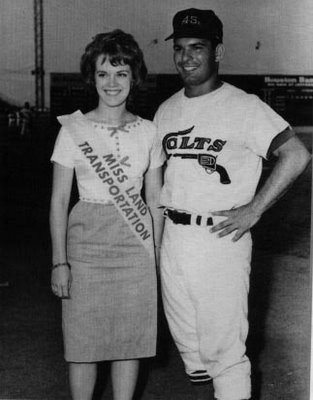
ERNIE FAZIO
Ernie Fazio was one of major league baseball’s very first bonus babies. He played two seasons for the fledgling Houston Colt .45’s, whom he signed with in 1962. He was the very first player signed by the team, just minutes before Rusty Staub. In 1963, he played semi-regularly for Houston, appearing in 102 games at second base, but batted only .184. In 1965, Fazio was traded to Charlie Finley and the Kansas City A’s, as the player to be named later in a trade that sent Jim Gentile to the Houston Astros for Jesse Hickman. Finley took Ernie under his wing, mainly because he liked his style of play, but 1966 would be Fazio’s last year in the major leagues, due to a life-threatening virus he suffered during spring training. Later he would work for Finley in the Oakland A’s front office for several years in the early 70’s. I met Ernie, now 62, in Hayward, where he works as a manager for a major sanitation company. He is a fun guy to be around, and loves to talk baseball. He is currently very involved in a lawsuit vs. MLB – an attempt to get pension money retroactively for the over 1,000 retired players who played in the big leagues for less than four years and received nothing. Baseball Pension.com says that “the pension and benefit program for retirees would not exist if not for the efforts of Ernie Fazio.” Ernie has a daughter who is a senior at UCLA and a star on the women’s soccer team.
“I signed out of Santa Clara University in 1962 with the Houston Colt .45’s for $100,000. My parents got ten grand. The people in Houston told me they would help me meet a girl down there, so that I could get married and save on income taxes. That was part of their pitch to me. They would set me up.”
“I really had a great time in Houston. I got to meet some of the astronauts, including John Glenn. I still have my original Colt .45 uniform. Collectors call me up all the time and want to buy it.”
“I hurt my arm that first year and they sent me down to Oklahoma City in the Pacific Coast League. I still have the record in that league for home runs by a second baseman (25). We won the PCL title, and I was healthy and all ready to go back up to the big club. I told them, I’m ready to play now. They said, “You’re not going up, you’re going home.” They had decided to go with Joe Morgan. We’re still good friends, Joe and I.”
“My problem was that when I got to Houston they tried to change my batting style.
They wanted me to become a slap hitter, to punch the ball, like Nellie Fox.”
“Then I went to the Kansas City A’s in 1966 to play for Charlie Finley. I loved that man. He always took care of his players – invested money for them; put down payments on houses for them, that type of stuff. I used to ride the mule for him all the time. I didn’t mind. I said to myself, “They’re worse things to do.”
“I got to hang out quite a bit with Joe DiMaggio during his time with the A’s. I asked him how he stayed in such great shape, because you know he smoked cigarettes, and he said, “I run.” He ran all the time to keep those legs in shape. He didn’t like the public. When we would play in these charity golf functions, he’d always skip the dinners afterwards. He just didn’t want to be bothered by people always coming up to him.”
“That stadium the Colt .45’s played in was so damn hot and humid and there were so many mosquitoes out there every day, they were like hordes of locusts. Johnny Temple used to eat lots of honey to keep the bugs away. It seemed to work, I don’t know.”
“After I left the A’s, I played in the minors in Hawaii. My roommate was Bo Belinsky. We had a great time, two single guys in Honolulu. Bo was a great guy to hang out with. He had his choice of any woman he wanted. And that’s all I can really say about that.”
“Bo introduced me to Jim Acho, an attorney, who got me involved in the pension case against major league baseball. The issue is that, in the old days, players who played for less than four years didn’t qualify for the pension. Back then, those were the rules. Now, if you play one day, you get medical benefits for life. If you are with a ball club for more than 45 days, you qualify for some pension money. There are over a thousand players out there who didn’t get a dime because they played less than four years.”
“My all-time team? I thought Sandy Koufax was incredible, even though I batted .333 against him. He would be my left-handed pitcher. Bob Gibson or Juan Marichal would be my right-hander, and Dennis Eckersley would be in the pen. The rest of my team – C: Bench; 3B: Colavito; SS: Banks; 2B: Mazeroski; 1B: Stan Musial. OF: Mays, DiMaggio and Clemente.”


